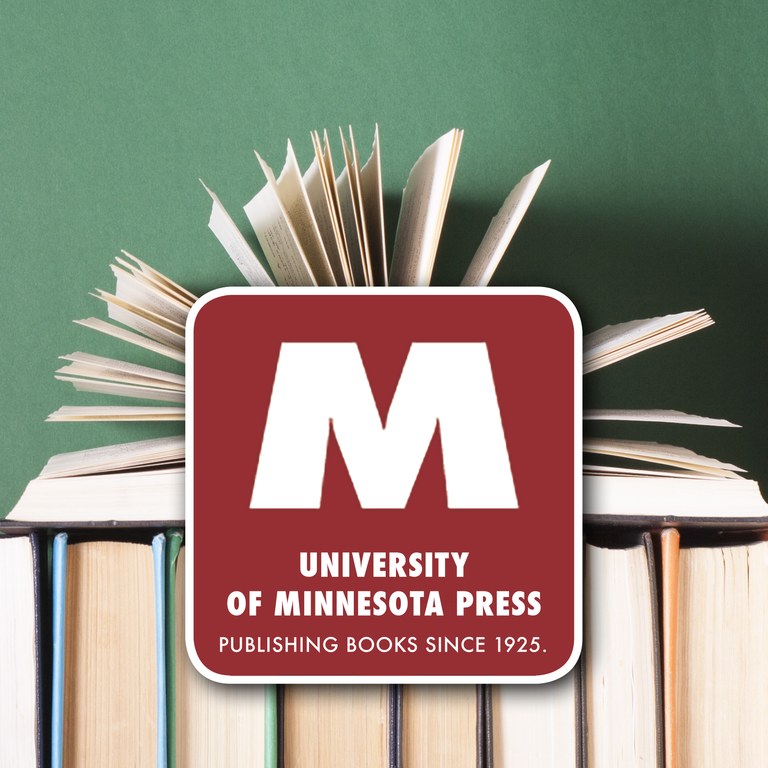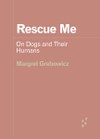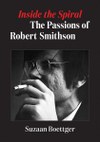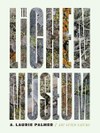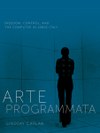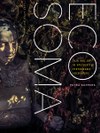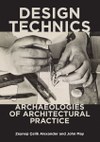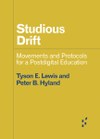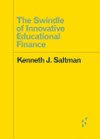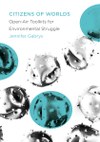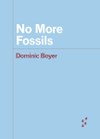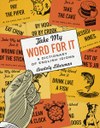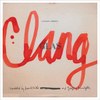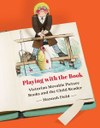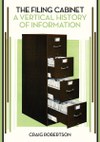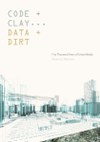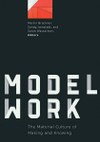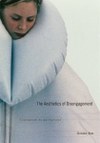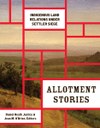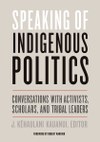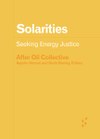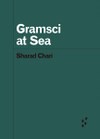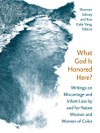UMP podcast: Learning tools and syllabus suggestions
The University of Minnesota Press podcast is a place where Press authors join peers, scholars, and friends in conversation. Topics include environment, humanities, race, social justice, cultural studies, art, literature and literary criticism, media studies, sociology, anthropology, grief and loss, mental health, and more. A more detailed listing of subjects is below.
The University of Minnesota Press podcast is available on the following platforms:
Spotify // Google Podcasts // Apple Podcasts
Amazon Music // SoundCloud // iHeartRadio
Podcast Addict // Listen Notes // TuneIn
Whether you're looking for syllabus suggestions or whether you're an independent reader looking for continuous learning inspiration, here are free teachable podcast episodes and the books they pair with from University of Minnesota Press.
Subjects:
ANIMAL STUDIES
Art
ARCHITECTURE AND DESIGN
Consumer culture
DISABILITY STUDIES
Economy
Education
ENVIRONMENTAL HUMANITIES, SCIENCE, AND ARTS
FILM STUDIES
LGBTQIA+
LINGUISTICS
Literary criticism
LITERATURE / NONFICTION AND MEMOIR
LITERATURE IN TRANSLATION
Material culture
MEDIA STUDIES
Mental health
NATIVE AMERICAN AND INDIGENOUS STUDIES
PETROCULTURES
PHILOSOPHY AND THEORY
RACE AND CRITICAL RACE THEORY
RACE AND GLOBALIZATION
Race and Social justice
Transracial adoption
ANIMAL STUDIES
Podcast episodes:
-Care is more than human—it's creaturely. Benjamin Meiches (Nonhuman Humanitarians) in conversation with Stef Fishel about the role of animals laboring alongside humans in humanitarian operations, opening up new ethical ways to consider human and nonhuman interactions.
-Imagining a new—human and nonhuman—grammar of urban life. Maan Barua (Lively Cities) in conversation with Sandra Jasper about the material politics of city making, examining the rhythms of nonhumans across the city, including macaques and cattle in Delhi and invasive parakeet colonies in London.
-Pooches. Planes. Pandemic. Margret Grebowicz and Christopher Schaberg talk about two experiences that were upended by the pandemic: dog ownership and air travel. Grebowicz (Rescue Me) discusses the abundance of pet adoptions (aka "The Great Adoption") and the existential and social implications of this trend.
-Saving Animals: On sanctuary, care, ethics with Elan Abrell (Saving Animals) and Kathryn (Katie) Gillespie on research ethics, witnessing, speciesism, and the politics of care practices in the US animal sanctuary movement.
-Art and Posthumanism with Cary Wolfe (Art after Nature Part 1): Cary Wolfe (Art and Posthumanism) talks with Art after Nature series editors Giovanni Aloi and Caroline Picard about the trajectory of posthumanism, deconstructing the blur between nature and culture, contemporary art and theory, biopolitics, philosophy, animal studies, and more.
-Capture: The nineteenth-century landscape and wildlife in modernity. Antoine Traisnel (Capture) in conversation with Michelle Neely (Against Sustainability) about how the drive to contain and record disappearing animals was a central feature and organizing pursuit of the nineteenth-century US cultural canon. With references to Muybridge and Audubon, Poe and Hawthorne, Whitman and Thoreau.
Subjects: animal rights; animal studies; environment; anthropology; Anthropocene; ethnography; fieldwork; modern animal condition; biocapitalism; biopolitics; literary criticism; theory
ART
-Art, time, nonlinearity with Manuela Infante and Mandy-Suzanne Wong (Art after Nature 5): A conversation about nonlinear narratives, language, playfulness, clarity, and plants with Art after Nature series editors Giovanni Aloi and Caroline Picard.
Subjects: critical plant studies, vegetal, theater, philosophy, posthumanism, existentialism, language, reality, appropriation, treedom, playfulness
-The Lichen Museum with A. Laurie Palmer (Art after Nature 4). A. Laurie Palmer (The Lichen Museum) gets philosophical, scientific, personal, and poetic about lichens with Art after Nature series editors Giovanni Aloi and Caroline Picard.
Subjects: lichens, symbiosis, art, ecology, museums, Anthropocene, climate change, interdisciplinarity, plant-thinking.
-Inside the Spiral: The Passions of Robert Smithson. Suzaan Boettger (Inside the Spiral) joins Greg Lindquist in conversation about the first biography of Robert Smithson and the potent forces in his life that were shrouded by his success.
Subjects: Robert Smithson, earthworks, art history, Nancy Holt, Spiral Jetty, biography, land art.
-Arte Programmata: An important antecedent to the digital age.Lindsay Caplan (Arte Programmata) in conversation with Tina Rivers Ryan and Jacopo Galimberti on the relationships between art, technology, and politics, showcasing the ingenuity of Italy's earliest computer-based art.
Subjects: art, technology, Italy, 1960s, new media art, politics, freedom, abstraction, cybernetics
-Activist archiving in the age of AIDS. Marika Cifor (Viral Cultures) in conversation with Cait McKinney, K.J. Rawson, and Theodore (Ted) Kerr, charting the efforts activists, artists, and curators have made to document the work of AIDS activism in the US and the infrastructure developed to maintain it. [Transcript.]
Subjects: American studies, visual culture, GLBT studies, AIDS, nostalgia, librarians, archivists, activism, ACT UP, VISUAL AIDS, vital nostalgia.
-Who is welcome? Hospitality and contemporary art. Irina Aristarkhova (Arrested Welcome) in conversation with artist and art educator Jorge Lucero, with references to contemporary artworks and what they teach about hospitality, including Linda Hattendorf's documentary film The Cats of Mirikitani, Ana Prvački, Faith Wilding, Lee Mingwei, Kathy High, Mithu Sen, Pippa Bacca and Silvia Moro's Brides on Tour, and Ken Aptekar's exhibition Neighbours. [Transcript.]
Subjects: art, hospitality, contemporary art, women's studies, feminist theory, performance studies, film, photography
-Eco Soma with Petra Kuppers (Art after Nature 2): Petra Kuppers (Eco Soma) talks with Art after Nature series editors Giovanni Aloi and Caroline Picard about art, performance, environment, awareness, attention, capitalism, language, identity, and disability culture. [Transcript.]
-Art and Posthumanism with Cary Wolfe (Art after Nature Part 1): Cary Wolfe (Art and Posthumanism) talks with Art after Nature series editors Giovanni Aloi and Caroline Picard about the trajectory of posthumanism, deconstructing the blur between nature and culture, contemporary art and theory, biopolitics, philosophy, animal studies, and more.
See also: Environmental Humanities
ARCHITECTURE AND DESIGN
Podcast episode: Architecture and object-oriented ontology with Graham Harman. Harman (Architecture and Objects) speaks with Art after Nature series editors Giovanni Aloi and Caroline Picard, exploring new concepts of the relationship between form and function. [Transcript.]
Subjects: architecture, object-oriented ontology (OOO), form, function, theory, aesthetics, Heidegger, Derrida, Deleuze
CONSUMER CULTURE
Podcast episode: The case for taking objects seriously with authors Christine Harold (Things Worth Keeping) and Nicole Seymour (Bad Environmentalism). [Transcript.]
Subjects: environmental governance; eco-narratives; consumer culture; materiality studies; design studies; maker culture; environmental rhetoric; thing theory
DISABILITY STUDIES
-Queer Silence with J. Logan Smilges, Travis Chi Wing Lau, and Margaret Price. A conversation on what silence can mean for people whose bodyminds signify more powerfully than their words, with insights from queer studies, disability studies, and rhetorical studies.[Transcript.]
Subjects: disability, rhetoric, queer studies, trans/gender, affect
-Eco Soma with Petra Kuppers (Art after Nature 2): Petra Kuppers (Eco Soma) talks with Art after Nature series editors Giovanni Aloi and Caroline Picard about art, performance, environment, awareness, attention, capitalism, language, identity, and disability culture. [Transcript.]
Subjects: social justice, disability culture, environment, art, performance, embodiment, identity, encounter
ECONOMY
Podcast episodes:
-The rise of economic and racial justice coalitions in cities: Marc Doussard (Justice at Work) in conversation with David B. Reynolds about coalitions to enact progressive labor market policies, from $15 minimum wages to paid sick leave.
-Making creative laborers for a precarious economy. Josef Nguyen (The Digital Is Kid Stuff) in conversation with Carly Kocurek and Patrick LeMieux about constructions of creativity, childhood, entrepreneurialism, and technological savvy; also Minecraft, Make magazine, Instagram, and design fiction.
-The crime of black repair in Jamaica. Jovan Scott Lewis (Scammer's Yard) in conversation with Peter James Hudson, asking what constitutes a crime and questioning the fairness of a world economy that relegates Caribbean populations to durative sufferation, with focus on Lewis's ethnographic fieldwork in Montego Bay. [Transcript.]
EDUCATION
Podcast episodes:
-Expelling public schools: Antiracist politics and school privatization. John (Jay) Arena (Expelling Public Schools, Driven from New Orleans) talks with David Forrest (A Voice but No Power) about the role of identitarian politics in the privatization of Newark's public school system—a conflict that is raging in cities across the country.
-What would an education beyond learning look like? Tyson E. Lewis and Peter B. Hyland (Studious Drift) engage colleague James Thurman in conversation about postdigital education and the studio space.
-Data and its role in education policy: Kalervo Gulson and Sam Sellar (Algorithms of Education) ask how educational policy studies need to shift to remain adequate to the emergence of powerful forms of technology, and discuss a new politics of education.
-Making creative laborers for a precarious economy. Josef Nguyen (The Digital Is Kid Stuff) in conversation with Carly Kocurek and Patrick LeMieux about constructions of creativity, childhood, entrepreneurialism, and technological savvy; also Minecraft, Make magazine, Instagram, and design fiction.
ENVIRONMENTAL HUMANITIES, SCIENCE, AND ARTS
Podcast episodes:
-Art, time, nonlinearity with Manuela Infante and Mandy-Suzanne Wong (Art after Nature 5): A conversation about nonlinear narratives, language, playfulness, clarity, and plants with Art after Nature series editors Giovanni Aloi and Caroline Picard.
-Sugar, coal, oil: No more fossils. Dominic Boyer (No More Fossils) and Cara Daggett (The Birth of Energy) discuss the rise of fossil civilization through sucropolitics, carbopolitics, and petropolitics, and try to grasp a civilization wholly beyond fossils.
-Cactus hunters and the illicit succulent trade. Jared Margulies (The Cactus Hunters) talks with Samantha Walton about the fascinating world of succulent collecting and the passions that drive the desire for plants.
-Redefining extinction through thawing permafrost. Charlotte Wrigley (Earth, Ice, Bone, Blood) talks with Pey-Yi Chu about extinction, de-extinction, discontinuity, and thawing permafrost, with research in the coldest corners of the world.
-Ark thinking: Climate change and the Great Flood. Jeffrey J. Cohen and Julian Yates (Noah's Arkive) talk with Steven Swarbrick (The Environmental Unconscious) uncover the startling afterlife of the Genesis narrative and examine the long history of imagining endurance against climate change catastrophe.
-The Lichen Museum with A. Laurie Palmer (Art after Nature 4). A. Laurie Palmer (The Lichen Museum) gets philosophical, scientific, personal, and poetic about lichens with Art after Nature series editors Giovanni Aloi and Caroline Picard.
Subjects: lichens, symbiosis, art, ecology, museums, Anthropocene, climate change, interdisciplinarity, plant-thinking.
-Making breathable worlds through citizen engagement: Jennifer Gabrys (Citizens of Worlds) talks with Helen Pritchard about Citizen Sense's research and its collaborative projects working with communities in the US and UK to develop digital-sensor toolkits.
-Eco Soma with Petra Kuppers (Art after Nature 2): Petra Kuppers (Eco Soma) talks with Art after Nature series editors Giovanni Aloi and Caroline Picard about art, performance, environment, awareness, attention, capitalism, language, identity, and disability culture.
-Art and Posthumanism with Cary Wolfe (Art after Nature Part 1): Cary Wolfe (Art and Posthumanism) talks with Art after Nature series editors Giovanni Aloi and Caroline Picard about the trajectory of posthumanism, deconstructing the blur between nature and culture, contemporary art and theory, biopolitics, philosophy, animal studies, and more.
-Life in Plastic: Petrochemical Fantasies and Synthetic Sensibilities (Part 1): Caren Irr, Lisa Swanstrom, Jennifer A. Wagner-Lawlor, and Daniel Worden (Life in Plastic) talk plasticity and myth, stretchy superheroes, plastic as gendered, plastic as colonizing force, plastic in art and everyday life, and more.
-Life in Plastic: Plastic's Capitalism (Part 2): Caren Irr, Crystal Bartolovich, Christopher Breu, and Sean Grattan (Life in Plastic) talk postplastic utopias, affective politics, public health, temporality, globalism, class, geopolitics, literature, and activism.
-Attending to body and Earth in distress: Ranae Lenor Hanson (Watershed) joins Teddie Potter (clinical professor in the School of Nursing and Director of Planetary Health at the University of Minnesota) and Lena Jones (political science faculty member at Minneapolis College and connected to the Center for Earth, Energy and Democracy) in conversation about how the health of our bodies and the health of the world they inhabit are inextricably linked. [Transcript.]
-Planetary probiotics and Gaia's variants. Jamie Lorimer (The Probiotic Planet) and Bruce Clarke (Gaian Systems) discuss a range of topics including Lynn Margulis, science fiction, neocybernetics, and COVID-19, and ultimately seek insight into an environmental crisis of humanity's own making.
-Capture: The nineteenth-century landscape and wildlife in modernity. Antoine Traisnel (Capture) in conversation with Michelle Neely (Against Sustainability) about how the drive to contain and record disappearing animals was a central feature and organizing pursuit of the nineteenth-century US cultural canon. With references to Muybridge and Audubon, Poe and Hawthorne, Whitman and Thoreau.
-Why art? On performance, theater, deep time, and the environment: With Patricia Eunji Kim, art historian and assistant professor/faculty fellow at the Gallatin School of Individualized Studies at New York University; Kate Farquhar, landscape designer; and Marcia Ferguson, senior lecturer in theatre arts at the University of Pennsylvania.
-Time and the interplay between human history and planetary history: Carolyn Fornoff, coeditor of Timescales, in conversation with contributors Jen Telesca of Pratt Institute, Wai Chee Dimock of Yale University, and Charles Tung of Seattle University. [Transcript.]
-Scientists and humanists talk timescales and climate change, featuring contributors to Timescales: Thinking across Ecological Temporalities: Bethany Wiggin, director of the Penn Program in Environmental Humanities; oceanographer Frankie Pavia; law student Jason Bell; and geophysicist Jane Dmochowski. [Transcript.]
-Hope and art when the world is falling apart features contributors to An Ecotopian Lexicon: anthropologist and herbalist Charis Boke, visual artist Michelle Kuen Suet Fung, and Sam Solnick of the University of Liverpool. [Transcript.]
-On deep time, extinction, and reframing our relationship with geological time with David Farrier, author of Anthropocene Poetics, and Adam Dickinson, author of Anatomic. [Transcript.]
-During a time when 90% of the world's big fish are gone, Jen Telesca (Red Gold) illustrates the managed extinction of the giant bluefin tuna in a conversation with editor Jason Weidemann. [Transcript.] Download: a Red Gold discussion guide.
Subjects: environmental humanities, climate change, the Anthropocene, ecology, sustainability, anthropology, environment and society, geography, philosophy, animal studies, art, photography, performance art, science, ecocriticism, deep time, extinction studies, ocean resource management, wildlife
FILM STUDIES
Podcast episodes:
-The New American War Film: Robert Burgoyne (The New American War Film, Film Nation) talks with Kim Nelson about the breakdown of prevailing cultural narratives that had come to characterize conflict in the previous century, through films such as The Hurt Locker, Zero Dark Thirty, Eye in the Sky, American Sniper, and others.
-Cruisy, Sleepy, Melancholy: On filmmaker Tsai Ming-liang. Nicholas de Villiers (Cruisy, Sleepy, Melancholy) talks with Beth Tsai about Tsai's films and connections between sexuality, space, and cinema.
LGBTQIA2S+
Podcast episodes:
-Tracing the roots of toxic masculinity. K. Allison Hammer (Masculinity in Transition) in conversation with Kale Fajardo (Filipino Crosscurrents) about masculinity, its shifting relationships in canonical works of history and film, its new valence since 2016, and its roots in a complex set of ideologies embedded in the histories of settler colonialism, racial capitalism, and political fraternity.
-Comics, visual culture, and feminism in the 1980s. Margaret Galvan (In Visible Archives) digs deep into the archives and analyzes how 1980s visual culture provided a vital space for women artists to theorize and visualize their own bodies and sexualities. In conversation here with Anna Peppard and Ramzi Fawaz.
-Queer Silence with J. Logan Smilges, Travis Chi Wing Lau, and Margaret Price. A conversation on what silence can mean for people whose bodyminds signify more powerfully than their words, with insights from queer studies, disability studies, and rhetorical studies.[Transcript.]
-Christopher Isherwood's California lectures: In the 1960s, Isherwood gave an unprecedented series of lectures about his life and work, speaking openly for the first time about his craft and spirituality. On the occasion of an updated edition of Isherwood on Writing, editor James J. Berg chats with Chris Freeman and Claude Summers.
-Being trans and feeling bad. Hil Malatino (Side Affects) in conversation with Zena Sharman (The Care We Dream Of) at a virtual event hosted by White Whale Bookstore. [Transcript.] [This conversation is also available to watch on YouTube.]
-Activist archiving in the age of AIDS. Marika Cifor (Viral Cultures) in conversation with Cait McKinney, K.J. Rawson, and Theodore (Ted) Kerr, charting the efforts activists, artists, and curators have made to document the work of AIDS activism in the US and the infrastructure developed to maintain it. [Transcript.]
-Christopher Isherwood in Transit: A 21st-Century Perspective featuring Jim Berg and Chris Freeman in conversation with University of Minnesota Press director Doug Armato on the book and Isherwood's history of publication in the US. [Transcript.]
LINGUISTICS
Podcast episode: Anatoly Liberman (Take My Word for It) in conversation with Ari Hoptman and J. Lawrence Mitchell. Pert as a pearmonger? Fit as a fiddle? Where do these English idioms come from?
LITERARY CRITICISM
Podcast episode: Christopher Isherwood's California lectures: In the 1960s, Isherwood gave an unprecedented series of lectures about his life and work, speaking openly for the first time about his craft and spirituality. On the occasion of an updated edition of Isherwood on Writing, editor James J. Berg chats with Chris Freeman and Claude Summers.
Subjects: Christopher Isherwood; archives; California; lectures; GLBT literature; gay studies; A Single Man
Podcast episode: Cacaphonies: The Excremental Canon of French literature features author Annabel L. Kim in conversation with Merve Emre, Rachele Dini, and Laure Murat taking seriously the place of fecal matter in French literature.
Subjects: 20th- and 21st-century French literature; humanities; literary criticism; literary theory; universalism; shit; democratizing literature; Louis-Ferdinand Céline; Jean Genet; James Joyce; Samuel Beckett; Susan Signe Morrison.
Podcast episode: Christopher Isherwood in Transit: A 21st-Century Perspective featuring authors and Isherwood scholars Jim Berg and Chris Freeman in conversation with University of Minnesota Press director Doug Armato on the book and Isherwood's history of publication in the US. [Transcript.]
Subjects: Christopher Isherwood; memoir and autobiography; travel writing; gay studies; Los Angeles; writers in exile
LITERATURE / NONFICTION AND MEMOIR
Podcast episodes:
-Blowdown in the Boundary Waters: Cary Griffith (Gunflint Falling) in conversation with Lee Frelich and Peter Leschak about the response efforts and implications of the historic 1999 derecho, which shaped the region's forests in ways yet to be fully understood.
-Jeremy Norton, a longtime firefighter and emergency medical technician, author of Trauma Sponges: Dispatches from the Scarred Heart of Emergency Response, in conversation with Minneapolis Fire Department colleagues and captains.
-Attending to body and Earth in distress: Ranae Lenor Hanson (Watershed) joins Teddie Potter (clinical professor in the School of Nursing and Director of Planetary Health at the University of Minnesota) and Lena Jones (political science faculty member at Minneapolis College and connected to the Center for Earth, Energy and Democracy) in conversation about how the health of our bodies and the health of the world they inhabit are inextricably linked. [Transcript.]
-Reflecting on the traumas we endured in 2020, We Are Meant to Rise is a collection of Indigenous writers and writers of color who bear witness to one of the most unsettling years in the history of the US. This is a recording of a live event at Next Chapter Booksellers in St. Paul, Minnesota, on Nov. 29, 2021. Featuring Carolyn Holbrook, David Mura, Douglas Kearney, Melissa Olson, Said Shaiye, and Kao Kalia Yang.
-A three-part mental health series featuring author Mindy Greiling (Fix What You Can: Schizophrenia and a Lawmaker's Fight for Her Son) in conversation with: (1) Minnesota Public Radio's Alisa Roth on the criminalization of mental illness [Transcript.]; (2) Dr. George Realmuto, psychiatry professor at the University of Minnesota, on mental illness and substance abuse [Transcript.]; and (3) Jim Trepp, author of Lodge Magic, on recovery and better futures for persons with mental illness. [Transcript.]
Download: A 30-page study guide with information on understanding symptoms, discussion questions, and resources.
-Miscarriage and infant loss are experiences that disproportionately affect Indigenous women and woman of color. Contributors to What God Is Honored Here? speak about the traumas and tragedies of womanhood: co-editors Shannon Gibney and Kao Kalia Yang and writers Michelle Borok, Soniah Kamal, Jami Nakamura Lin, and Seema Reza. [Transcript.]
-"The way you show up is everything": History-making explorer Natalie Warren (Hudson Bay Bound) talks with history-making explorer Ann Bancroft (No Horizon Is So Far) about their history-making expeditions on land and sea.
LITERATURE IN TRANSLATION
Podcast episodes:
Sylvain Tesson's wandering journey of solitude through the vast countryside of France. Eric Lundgren of University of Minnesota Press in conversation with author Daniel Hornsby about Tesson's three-month walking journey of solitude and personal contemplation. Les Chemins de Pierre, a film based on the book starring Jean Dujardin, is expected to release later in 2022. This translation is published with the support of Villa Albertine, in partnership with the French Embassy.
Subjects: Sylvain Tesson, French literature, literature in translation, philosophy, meditation, walking, hiking, travelogue, environmental humanities, book-to-film adaptation
Balzac in translation: Portraits of a turbulent 19th-century France with remarkable contemporary resonances. Balzac translator Raymond MacKenzie (Lost Illusions, Lost Souls) in conversation with Press director Doug Armato. [Transcript.]
Subjects: Honoré de Balzac, translation, Comedie Humaine, Human Comedy, France, 19th century, book-to-film adaptation
MATERIAL CULTURE
Podcast episode: Edith Wharton and the personal library with author Sheila Liming (What a Library Means to a Woman), Wharton scholar Donna Campbell, and Nynke Dorhout and Anne Schuyler of The Mount in Lenox, MA. [Transcript.]
Subjects: Edith Wharton; book history; material and print culture; histories of collecting; late 19th and early 20th-century American culture; libraries and self-making; women's history; women's education; history of the book
MEDIA STUDIES
Podcast episodes:
-Making creative laborers for a precarious economy. Josef Nguyen (The Digital Is Kid Stuff) in conversation with Carly Kocurek and Patrick LeMieux about constructions of creativity, childhood, entrepreneurialism, and technological savvy; also Minecraft, Make magazine, Instagram, and design fiction.
How information became a "thing": exploring how the now-neglected filing cabinet profoundly shaped the way that information and data have been sorted, stored, retrieved, and used. Featuring Craig Robertson (The Filing Cabinet), Shannon Mattern (Code and Clay, Data and Dirt), and Lisa Gitelman (Modelwork).
Subjects: media studies; science and technology studies; design; media history; history of information; history of technology; twentieth-century American history; creativity; childhood; contemporary labor economy
MENTAL HEALTH
Podcast episodes: A three-part mental health series featuring author Mindy Greiling (Fix What You Can: Schizophrenia and a Lawmaker's Fight for Her Son) in conversation with: (1) Minnesota Public Radio's Alisa Roth on the criminalization of mental illness [Transcript.]; (2) Dr. George Realmuto, psychiatry professor at the University of Minnesota, on mental illness and substance abuse [Transcript.]; and (3) Jim Trepp, author of Lodge Magic, on recovery and better futures for persons with mental illness. [Transcript.]
Download: A 30-page study guide with information on understanding symptoms, discussion questions, and resources.
Subjects: psychology, psychiatry, social work, mental health system, nursing, chemical dependency, criminalization of mental illness, public policy
NATIVE AMERICAN AND INDIGENOUS STUDIES
Podcast episodes:
-"How do you start to tell the story of who you are in a language where you're just trying to figure this all out?" Sarah Biscarra Dilley and Joseph M. Pierce (contributors, Allotment Stories) share their pieces of the history of white imperialism and Indigenous resistance, highlighting how Indigenous peoples have consistently engaged creativity to sustain collective ties, kinship relations, and cultural commitments in the face of land privatization.
-"It's not a story of easy heroes and easy villains": Diving into the longstanding and ongoing settler colonial process of land privatization, Daniel Heath Justice and Jean M. O'Brien (Allotment Stories) talk about the urgency of these conversations on dispossession and reposession as featured in the book's collected works; and also discuss considerations that go into publishing an edited collection. [Transcript.]
Subjects: Native American and Indigenous studies; American history; American studies; settler colonialism; land privatization; edited collection; Dawes Allotment Act of 1887; McGirt v. Oklahoma; Cobell v. Salazar.
PETROCULTURES
Podcast episodes:
-The disruptive forces of an oil boom: Mary E. Thomas and Bruce Braun (coeditors, Settling the Boom) discuss the unsettled energy landscape of the Bakken oil boom in western North Dakota.
-Sugar, coal, oil: No more fossils. Dominic Boyer (No More Fossils) and Cara Daggett (The Birth of Energy) discuss the rise of fossil civilization through sucropolitics, carbopolitics, and petropolitics, and try to grasp a civilization wholly beyond fossils.
-Life in Plastic: Petrochemical Fantasies and Synthetic Sensibilities (Part 1): Caren Irr, Lisa Swanstrom, Jennifer A. Wagner-Lawlor, and Daniel Worden (Life in Plastic) talk plasticity and myth, stretchy superheroes, plastic as gendered, plastic as colonizing force, plastic in art and everyday life, and more.
-Life in Plastic: Plastic's Capitalism (Part 2): Caren Irr, Crystal Bartolovich, Christopher Breu, and Sean Grattan (Life in Plastic) talk postplastic utopias, affective politics, public health, temporality, globalism, class, geopolitics, literature, and activism.
-Time and the interplay between human history and planetary history: Carolyn Fornoff, coeditor of Timescales, in conversation with contributors Jen Telesca of Pratt Institute, Wai Chee Dimock of Yale University, and Charles Tung of Seattle University. [Transcript.]
-Scientists and humanists talk timescales and climate change, featuring contributors to Timescales: Thinking across Ecological Temporalities: Bethany Wiggin, director of the Penn Program in Environmental Humanities; oceanographer Frankie Pavia; law student Jason Bell; and geophysicist Jane Dmochowski. [Transcript.]
PHILOSOPHY AND THEORY
Podcast episodes:
-Gramsci at Sea: Sharad Chari (Gramsci at Sea) talks with Charne Lavery, Melissa Marschke, and Philippe Le Billon about Antonio Gramsci, drawing on the philosopher's prison notes to read him as a thinker of the oceanic crisis.
-On Nietzsche and posthumanist philosphy: Edgar Landgraf (Nietzsche's Posthumanism), with Christian Emden and Stefan Herbrechter explore Nietzsche's reception of the life sciences of his day.
-Have we ever been civilian? On war's expansion beyond the battlefield. Mike Hill (On Posthuman War) joins Robyn Marasco and Warren Montag in conversation about the expansion of war as manifest within humanity's individual, sociocultural, and biological existence.
-Pooches. Planes. Pandemic. Margret Grebowicz (Rescue Me) and Christopher Schaberg (Grounded) talk about two experiences that were upended by the pandemic: dog ownership and air travel. Both are concerned with philosophical and critical inquiries into their subjects; how to think about things, how to frame phenomena and change, and how the future will continue to reshape these experiences.
-Dorion Sagan and Joshua DiCaglio on the cosmic challenge of scale. A dazzling conversation from the authors of Scale Theory and Cosmic Apprentice about how a theory of scale might challenge perspectives on space and time, philosophy, innerness, psychedelics—with careful attention to scientific thinking as well as fascination and mysticism, much attuned to the way scale transforms both reality and ourselves.
-A field guide to a nonfascist life at the end of the world as we know it: Andrew Culp (A Guerrilla Guide to Refusal) in conversation with Will Conway, Jose Rosales, and Violet, talking power, surveillance, cybernetics, class war, transformation. [Transcript.]
-Art and Posthumanism with Cary Wolfe (Art after Nature Part 1): Cary Wolfe (Art and Posthumanism) talks with Art after Nature series editors Giovanni Aloi and Caroline Picard about the trajectory of posthumanism, deconstructing the blur between nature and culture, contemporary art and theory, biopolitics, philosophy, animal studies, and more.
RACE AND CRITICAL RACE THEORY
Podcast episodes:
-How feelings about race are normalized by media culture: Allison Page (Media and the Affective Life of Slavery) and Brittany Farr analyze how media culture instructs viewers to act and feel in accordance with new racial norms created for an era supposedly defined by an end to legal racism.
Subjects: race, media, affect, slavery, capitalism, cultural studies, American studies, governmentality, digital media, algorithmic culture, television
-How institutionalized racism shapes health in the 21st century: Anne Pollock (Sickening) speaks with Ruha Benjamin about the unconscionable disparity in health outcomes between Black and white Americans.
Subjects: racism, health disparities, biopolitics, 2001 anthrax attacks, Hurricane Katrina, mass incarceration, Flint water crisis, liberatory imagination, Serena Williams, reproductive justice
-Race and the politics of precarity in the United States: Daniel Martinez HoSang and Joseph Lowndes (Producers, Parasites, Patriots: Race and the New Right-Wing Politics of Precarity) on the 1619 Project, the 1776 Report, and recent and ongoing attacks on critical race theory.
Subjects: critical race theory; race and politics; race, class, and gender; race and ethnic relations; American history; Introduction to American Studies; US political institutions; US political thought; politics and culture
-How the ordinary postwar home constructed race in America: Dianne Harris (Little White Houses) in conversation with Mabel O. Wilson about the construction and representation of racial identity in midcentury suburban housing.
Subjects: critical race theory; race and architecture; architectural history; American history; US housing market inequalities; race and class politics
RACE AND GLOBALIZATION
Podcast episodes:
-How might we understand borders and citizenship in a post-Brexit context? Suzanne Hall (The Migrant's Paradox) examines the brutal contradictions of sovereignty and capitalism in the formation of street livelihoods in the urban margins in five cities in Britain. Hall joins Tariq Jazeel, Huda Tayob, and Les Back in this conversation published in partnership with Environment and Planning D: Society and Space.
-The crime of black repair in Jamaica. Jovan Scott Lewis (Scammer's Yard) in conversation with Peter James Hudson, asking what constitutes a crime and questioning the fairness of a world economy that relegates Caribbean populations to durative sufferation, with focus on Lewis's ethnographic fieldwork in Montego Bay. [Transcript.]
Subjects: sociology, geography, anthropology, ethnography, globalization, postcolonialism, migration, citizenship, racial capitalism, diverse economies, world economics, Caribbean studies, Jamaica, reparation, criminal justice
RACE AND SOCIAL JUSTICE
Podcast episodes:
-Political violence and abolitionist futures. Nicole Nguyen (Terrorism on Trial) talks with Nadine Naber about the role of the US judicial system in reinforcing global, regional, and local regimes of war, empire, and confinement through the adjudication of terrorism-related cases in the US.
-Reflecting on the traumas we endured in 2020, We Are Meant to Rise is a collection of Indigenous writers and writers of color who bear witness to one of the most unsettling years in the history of the US. This is a recording of a live event at Next Chapter Booksellers in St. Paul, Minnesota, on Nov. 29, 2021. Featuring Carolyn Holbrook, David Mura, Douglas Kearney, Melissa Olson, Said Shaiye, and Kao Kalia Yang.
-Miscarriage and infant loss are experiences that disproportionately affect Indigenous women and woman of color. Contributors to What God Is Honored Here? speak about the traumas and tragedies of womanhood: co-editors Shannon Gibney and Kao Kalia Yang and writers Michelle Borok, Soniah Kamal, Jami Nakamura Lin, and Seema Reza. [Transcript.]
-Creative writing as a powerful tool for challenging racism: Carolyn Holbrook, author of Tell Me Your Names and I Will Testify, in conversation with Sherrie Fernandez-Williams, author of Soft: A Memoir. [Transcript.]
-How digital technology has further entrenched the United States' racialized policing and punishment: author Brian Jefferson (Digitize and Punish: Racial Criminalization in the Digital Age) in conversation with editor Pieter Martin. [Transcript.]
Subjects: race, antiracism, structural racism, racial equity, social justice, women's studies, social work, nursing, creative writing, race and the criminal justice system
TRANSRACIAL ADOPTION
Podcast episodes:
-What society gets wrong about transracial adoption: Outsiders Within was first published in 2006 and released in a new edition in 2021: a year in which reproduction and adoption politics have been spotlighted anew. This episode features Sun Yung Shin, Shannon Gibney, and JaeRan Kim talking about what society often gets wrong about adoption.
-Korean and Vietnamese adoptees on the intimate racialized politics of transracial adoption: Three writers and artists who were adopted across geographic borders in the 1970s talk isolation, racism, identity struggle, adoption policy, and how the Internet has changed the ways connection can be found. Featuring Jane Jeong Trenka, Indigo Willing, and kimura byol-nathalie lemoine.
-"I may not be able to find my family but it always made me feel a step closer to help others." Jane Jeong Trenka (Outsiders Within) talks with Ami Nafzger. Both conversants were adopted to the midwestern United States from South Korea. Nafzger is founder of Adoptee Hub and Global Overseas Adoptees' Link.
Subjects: transracial adoption, adoption, nonfiction literature, essays, globalization, identity, policy, childhood studies, race and ethnic studies, sociology, South Korea.
